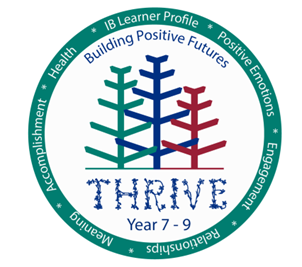Our ‘Thrive’ wellbeing program provides students with designated time in their timetable to gain knowledge, greater self-awareness and develop the skills and strategies needed, to thrive in Years 7-9 and beyond. Using a positive education approach to understanding happiness and wellbeing, we use the PERMAH framework as the foundation for this learning. Professor Martin Seligman, a leading researcher into positive psychology, who developed the PERMAH concept, advocates that wellbeing is cultivated by our attention to and the presence in our lives of positive emotion, engagement, relationships, meaning, accomplishment and health.

The goal of the Thrive program is to provide students with the opportunity to gain knowledge, greater awareness and develop the skills and strategies needed, so that they can Thrive in Years 7-9 and beyond.
Positive Emotions: being aware of our emotions and when our emotions are making decisions for us. We will learn about the ‘emotion mind’, ‘reasonable mind’ and ‘wise mind’. We will look at what ‘impulsiveness’ means and how ‘distress tolerance skills’ can help us to get through difficult moments without acting impulsively and making a situation worse.
Positive Engagement: understand your strengths, be curious and motivated, get involved in learning and school life: find what brings you joy- practice it frequently and don’t give up even when there is challenge can all lead to positive wellbeing, accomplishment and growth.
Positive Relationships: ‘interpersonal effectiveness skills’ can guide us to help get what we want from people, help maintain healthy relationships and to keep our self-respect. We will develop problem solving skills in our relationships with others.
Positive Meaning: developing a better understanding of what it is that makes you feel that you are living a meaningful and significant life. What gives you ‘meaning’ in life? Your family, friends, relationships, spirituality/religion, and/or educational pursuits? We will explore how the actions and emotions of generosity, empathy, forgiveness, kindness and gratitude can lead us to developing a greater sense of meaning.
Positive Accomplishment: our ability to work towards meaningful goals in our learning and for our behaviour (in respect to Positive emotions, engagement, relationships and health). In our learning, we will reflect on our achievements and make decisions about what we want to target and set goals for improvement. For our behaviour and wellbeing, we will also identify target behaviours that we want to increase and decrease.
Positive Health: developing greater knowledge and habits which enable us to have the best possible physical and mental health. Positive health is holistic in that it looks at the connection between the mind and the body. We will have a particular focus on what is means to be ‘confused or distracted’ or to be ‘unaware or not focussed’. Learning and trying out mindfulness strategies in class will help in this area.